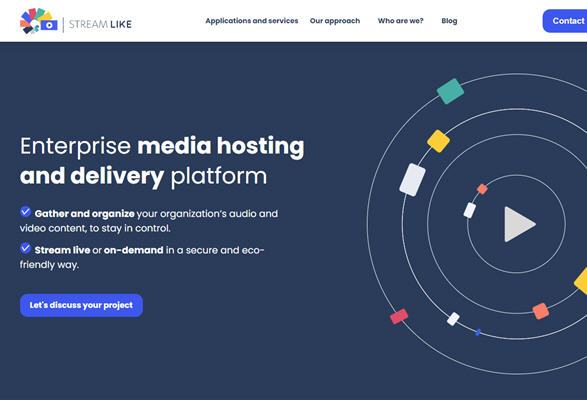This new site is an investment that translates into a very small gesture for the climate…
Before that, Streamlike financed an expertise of the Shift Project and integrated in the platform an emission measurement taking into account the type of terminal, the country of playback and the volume of data transmitted.
This measurement allowed us to recommend technical solutions and best practices for our customers to broadcast less data. More digital sobriety means fewer GHG emissions and savings for our customers. It is also a loss of revenue for a platform that makes this effort of responsibility.
Finally, we buy trees to sequester our customers’ residual CO2 emissions over a 20-year period.
If you add up the development costs, the purchase of trees and the savings we make for our customers, what we pay per gram of CO2 not emitted is astronomical, but it is the price of being in line with our values.
All this for a climate effect that remains symbolic. Streamlike doesn’t have the circulation volume of YouTube… and yet YouTube doesn’t do anything.
Is a symbolic effect worth the effort?
When it comes to digital responsibility, it is often said that we should focus on high-impact actions, that cleaning up our mailboxes is useless, that the manufacture of terminals has much more impact than their use. So as long as you don’t change your smartphone, you are doing something significant for the planet. Doing nothing very negative would be better than acting with a small positive effect. The praise of procrastination, in short.
On the contrary, we think that micro-gestures also count because we no longer have time to procrastinate. The ADEME recently repeated: without acting today, digital technology will not become carbon neutral in 2050, even if we don’t change our smartphone by then. (Bad) habits take a long time to change. It is essential not to neglect the uses and to give good examples.
From a company’s point of view (not a consumer’s), inaction is a negative action. Here are examples of actions with their effect, in the building, automotive, digital and streaming industries.
| Type of action | High negative impact | Low negative impact | No action | Low positive impact | High positive impact |
| Construction | Construct a new building that is not energy positive | No improvement in energy efficiency | Heat to 19°C; Build a low-energy or HEQ building | Improve insulation and heating system; Build a passive or positive energy building | |
| Automobile | Buy new SUVs, heavy sedans or 4×4s | Replace end-of-life vehicles with new, zero-emission vehicles | Don’t change driving habits and modes of transportation | Wait until the end of the life of the previous vehicle to buy a second hand one | Drive less; Carpool or take the train |
| Digital | Buy the latest equipment (4K TV, smartphones, tablets…) | Do not renew your equipment before the end of its life | At end of life, renew with reconditioned or sustainable equipment. Eco-design your websites and applications | Turn off instead of leaving on standby; Repair and recycle; Migrate to a green datacenter | |
| Streaming | Put your videos on YouTube; Stream in 4K | Restricting playback speeds; Stream in audio only when the video is useless | Migrate your content from YouTube to a platform that practices responsible streaming (Zero Net Emissions) |
It’s time to realize that for a company or an administration, claiming to be digitally responsible while putting its videos on YouTube doesn’t make sense.
Our actions are the result of an internal reflection on reducing our own environmental impact. It’s not a marketing posture, and we’d love for other B2B video platforms to follow us in promoting more responsible streaming.
Let’s be honest: we mainly engaged in the redesign of our website because it was necessary to reduce page load time, improve SEO, and to better understand our business and our solutions. We wouldn’t have done it just to save a few grams of CO2 per day, but since it was necessary, why not make an additional environmental gesture? We thank Ouest-Médias for creating a neat design with very rich pages but very light to load.
As always, a good green solution is above all a good solution. Green.
Enjoy your visit.
A word from the agency
By Pierre Minier, Associate Director of Ouest Médias.
Ouest Médias agency has managed for Mediatech the redesign of the streamlike.eu website according to precise specifications:
- Simple and uncluttered design in the respect of the existing graphic charter
- Respect of the information architecture and tree structure in place
- Maximum responsiveness
- Eco-performance
- CMS Easy to use
- Respect of the RGPD
The project lasted three months until the production launch at the end of March 2023 between the UX and UI phases, integration and development of the pages, reinjection of content from the old platform to the new one, optimization of the on-page SEO (Hn markup, title and description), compliance and performance tests.
The long and complex structure of the homepage required compromises between strict eco-design and overall performance, in the marketing sense (traffic acquisition and conversion) since it is a B2B site with a professional vocation.
The streamlike.fr website emits 0,14 g of CO2 per homepage loading (websitecarbon test).
It is credited with a grade A according to the GT Metrix intrinsic performance tests based on Lighthouse (Google) and Core Web Vitals compliance.
In terms of compliance with the RGPD, the Matomo audience measurement tool, which respects the privacy of users, is the only one installed at the expense of any intrusive tracking.
This first Mediatech / Streamlike x Ouest Médias partnership was made on the basis of shared values around the awareness of the impact of digital activities on the environment.
